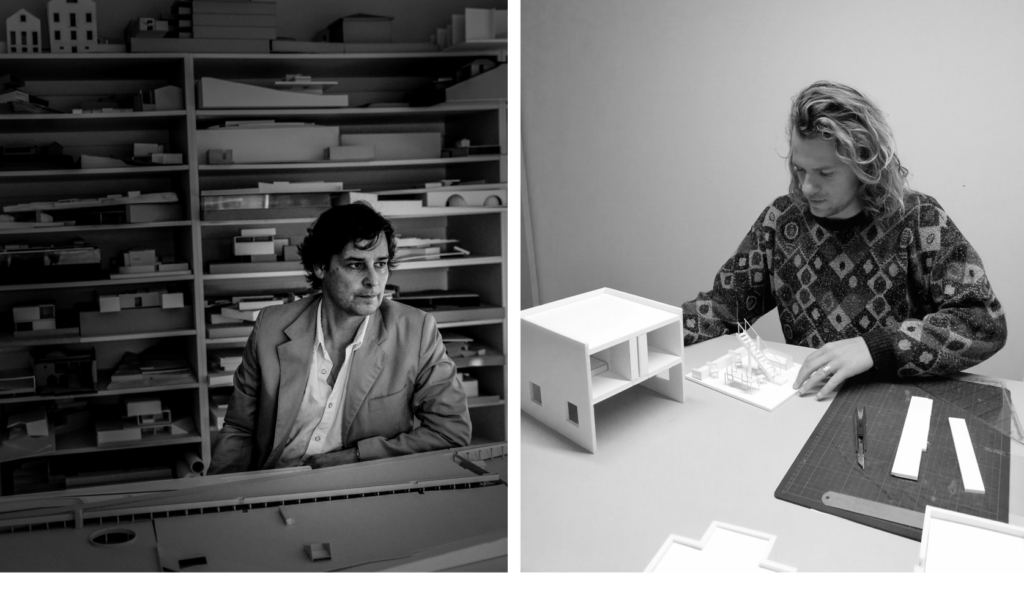
New Entrepreneur
Name & surname: Philipp Gruber
Country: Germany
Sector of activity: Architecture, Design, Photography
Did you already started your business?: Yes
Business: Freelancer in Architecture, Design & Photography
Host Entrepreneur
Name & surname: Nuno Brandão Costa
Country: Portugal
Sector of activity: Architecture
Experience in running a business (in years): 20 years
Website: www.brandaocosta.com
Business: Office for Architecture
Period of relationship: 01/12/19 – 31/05/20
Duration of relationship: 6 months
What were the main learnings for Philipp during his architecture project in Porto?
After my study abroad with the Erasmus+ programme in Porto, I was seeking for an opportunity to gain work experiences in the architectural context. I discovered the EYE programme through a friend that already took part and I decided to apply after I have started working as a freelancer in architecture and photography one year before. I aimed to collaborate with the Portuguese Nuno Brandão Costa because I appreciate his unique ideas about architecture, especially his artistic approach by using very simple and cost-effective elements of architecture in his design practice. Our goal was to participate in the programme in order to have a possibility to think together about future and innovative housing, especially in the project “Case study houses”.
“Case study houses” is a research project about experimental low-cost housing prototypes in Portugal. The focal point was to analyse domestic housing concepts in terms of affordability, sustainability and quality of space. The study consists of three different exemplary houses that are designed with minimum living areas between 60 and 70 sqm. Each house fits the basic needs for living in a small scale, providing the residents with 2 bedrooms, 1-2 bathrooms and a common space including kitchen and living room. Our goal was to develop a low-cost effective construction, using only local building materials from Portugal to achieve that each prototype does not cost more than 500 EUR/sqm. Moreover, we planned to develop a building configuration that is of good quality, quickly to manufacture and easy to assemble.
Nuno Brandão Costa is professor for design at the Faculty of Architecture of the University of Porto and besides he runs a small architectural office with place for four co-workers. The office is located close to the city centre in the social housing complex “Bairro da Bouça”, a very popular masterpiece from the famous architect Alvaro Siza Viera. I contributed to the day-to-day activities in the office and became easily part of the great team. Nuno and the team constantly provided me with exchange of ideas and knowledge, while I was working completely independent on the case study houses.
Firstly, I focused on the research about existing low-cost housing projects and concepts, analysing building structures, elements, quality of space and size of living areas. We used the results to define our goals more in detail. Following this, the next cornerstone was to analyse Nuno`s first sketches and ideas in order to design the three houses in scale 1:50 which shows the concept of each house, in particular the organisation of its living space.
After that, I worked on the construction and structure, selecting also different building materials that are produced in Portugal. For example, we decided to use Portuguese cork as high-quality and sustainable product for the floor and insulation of the houses. During the whole process, material and space studies helped me to prove and adjust our project goals.
That means I built several models in different scales to study the consequences of our decisions according to our aims. In the next step, we chose case study house 2 to be developed in the execution phase, where I made details that illustrate the construction layers and structural components of the house. In this project phase, I manufactured bigger study models with more detail in scale 1:33 to show the interiors including materials, staircase typology and furniture. We achieved a simple building configuration by using mostly prefabricated building components. To conclude the project, I evolved the cost calculation of house two by analysing material prices, quantity and construction costs.
At the end of our collaboration, we participated with one of the case study houses in an international architecture competition for low-cost housing that was announced by archdaily.
We showed our achieved work results in one poster and illustrated that we met all our goals of the project during our collaboration. The winner of the competition will be noticed during August 2020. Erasmus for Young Entrepreneurs gave me the opportunity to live and experience more profoundly the Portuguese culture and I feel grateful for choosing Porto again because this city is full of wonderful influences provided by amazing people and architecture. Both parts of the exchange, NE and HE, felt improvements in their business and took benefits by emerging discourses about architecture, design and business concerns like cost calculation and project adjustment tools. Nuno integrated more sustainable aspects in his practice and I gained more knowledge for my research and design skills. Generally, I am looking forward to implement my new know-how about low-cost housing to my personal path of my carrier as an architect.
Concluding Remarks
Philipp Gruber (NE): “It was a great experience to participate in the EYE programme and to work with Nuno Brandão Costa. I received insights about low-cost housing in Portugal and learned efficient working methods in the design and execution process of architecture projects. The programme gave me the possibility to experiment in the unknown context of research work in architecture and I seek to implement this new skill to my future practice.”
Nuno Brandão Costa (HE): “During our collaboration, Philipp Gruber played an essential role in the development of the architectural research project “Case study houses”. In the process of building up on the existing concept and turning it into a design object with all the attributes to be realized in the future, his intelligent and operating skills were essential for the success of the present state that we proposed to achieve during this period. Therefore, I am strongly legitimated to affirm that he fulfils all the required skills to be successful at any work he challenges himself to accomplish now and in the future.”
